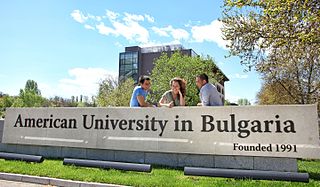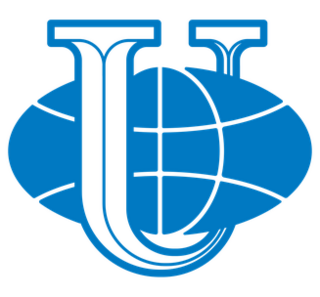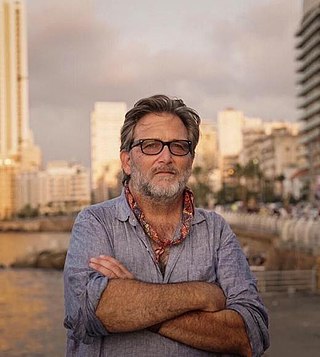Related Research Articles

A think tank, or policy institute, is a research institute that performs research and advocacy concerning topics such as social policy, political strategy, economics, military, technology, and culture. Most think tanks are non-governmental organizations, but some are semi-autonomous agencies within government, and some are associated with particular political parties, businesses or the military. Think tanks are often funded by individual donations, with many also accepting government grants.
Open Society Foundations (OSF), formerly the Open Society Institute, is a US-based grantmaking network founded by business magnate George Soros. Open Society Foundations financially supports civil society groups around the world, with the stated aim of advancing justice, education, public health and independent media. The group's name was inspired by Karl Popper's 1945 book The Open Society and Its Enemies.

The American University in Bulgaria (AUBG) is a private university in Blagoevgrad, Bulgaria. Established in 1991, AUBG had about 1,000 students from over 40 countries on 5 continents as of Fall 2022. Close to 40% of the students are international.

The Patrice Lumumba Peoples' Friendship University of Russia, also known as RUDN University and until 1992 and after March 2023, as Patrice Lumumba University in honour of the Congolese politician Patrice Lumumba, is a public research university located in Moscow, Russia. It was established in 1960 by a resolution from the Central Committee of the CPSU and the Council of Ministers of the USSR to help nations to assist countries that had recently achieved independence from colonial powers. The university also acted to further Soviet foreign policy goals in nonaligned countries.
The Canadian International Development Agency (CIDA) was a federal Canadian organization that administered foreign aid programs in developing countries. The agency was merged into the Department of Foreign Affairs in 2013 by the federal government under Prime Minister Stephen Harper.
The United Nations defines community development as "a process where community members come together to take collective action and generate solutions to common problems." It is a broad concept, applied to the practices of civic leaders, activists, involved citizens, and professionals to improve various aspects of communities, typically aiming to build stronger and more resilient local communities.
An urban debate league (UDL) is a group of high school policy debate teams from urban high schools in the United States. UDLs are generally located in large cities throughout the United States and work predominantly with minority students.

Civic engagement or civic participation is any individual or group activity addressing issues of public concern. Civic engagement includes communities working together or individuals working alone in both political and non-political actions to protect public values or make a change in a community. The goal of civic engagement is to address public concerns and promote the quality of the community.

Molly Melching is the founder and Creative Director of the Tostan Community Empowerment Program (CEP). Tostan is a non-governmental organization (NGO) headquartered in Dakar, Senegal whose mission is to empower African communities to bring about sustainable development and positive social transformation based on respect for human rights. Her website, Tostan.org, states "Tostan implements a holistic, three-year empowering education program in African national languages that has engaged over 3,500 rural communities in eight African countries on themes of democracy, human rights, health, literacy, and project management skills". These themes include the abandonment of female genital cutting, the abolishment of child/forced marriage, and female empowerment in leadership positions such as leadership positions in countries across West and East Africa.

Transitions Online is a media development organization and online journal covering news and events in the 31 post-Communist countries of Eastern Europe, Central Europe, South Eastern Europe, Russia, the Baltics, the Caucasus, Central Asia. It was founded in the Czech Republic in 1999.

The Van Leer Jerusalem Institute (VLJI) is a center for the interdisciplinary study and discussion of issues related to philosophy, society, culture, and education. The Institute was established in order to create a body of knowledge and discourse and to give expression to the wide range of disciplines and opinions in Israel. The contribution of a core of renowned scholars facilitates the implementation of reforms and new approaches in various social spheres.
Scholars at Risk (SAR) is a United States-based international network of academic institutions organized to support and defend the principles of academic freedom and to defend the human rights of scholars around the world. Network membership includes over 530 higher educational institutions in 42 countries.
Media development involves capacity building for institutions or individuals related to freedom of expression, pluralism and diversity of media, as well as transparency of media ownership. Media development plays a role in democracy and effective democratic discourse through supporting free and independent media.
The open-source-software movement is a movement that supports the use of open-source licenses for some or all software, as part of the broader notion of open collaboration. The open-source movement was started to spread the concept/idea of open-source software.

Keith David Watenpaugh is an American academic. He is Professor of Human Rights Studies at the University of California, Davis. A leading American historian of the contemporary Middle East, human rights, and modern humanitarianism, he is an expert on the Armenian genocide and its denial, and the role of the refugee in world history.

Reuven Gal is an Israeli social and clinical psychologist, a social activist and entrepreneur, researcher, author and consultant in the field of behavioural, communal and social sciences.
The Muslim Philanthropy Digital Library (MPDL) is an online project by the American University in Cairo's John D. Gerhart Center for Philanthropy and Civic Engagement and the Center of Excellence for the Middle East and Arab Cultures, AUC Library) and Indiana University, that makes all forms of information on philanthropy available through original documents, reports, graphics, waqf registrations, as well as scholarly analysis in Muslim-majority countries and communities worldwide. Start-up funding for the library in Cairo was provided by The International Development Research Centre of Canada.
The International Centre for Policy Studies (ICPS) is an independent NGO, founded in 1994 which aims to promote public policy concepts and practice and apply them to influential policy research that affects both the public and private sectors in Ukraine.

The University of Applied Sciences Ludwigshafen is a public university located in Ludwigshafen, Germany. It was founded in 1965 as Higher School of Commerce Ludwigshafen. In 1971 it became part of the University of Applied Sciences Rhineland Palatinate, which split up into seven autonomous universities in 1991.
References
- ↑ Sarah D. Phillips (2008). Women's Social Activism in the New Ukraine: Development and the Politics of Differentiation. Indiana University Press. p. 180. ISBN 978-0-253-21992-3.
The Civic Education Project was founded in 1991
- ↑ Apor, Peter (2019-01-22). "COURAGE Country Reports".
{{cite journal}}: Cite journal requires|journal=(help)